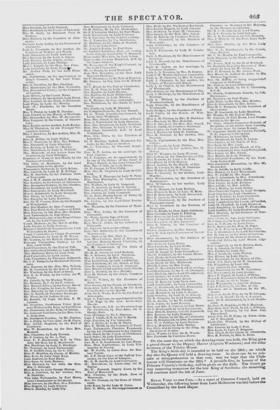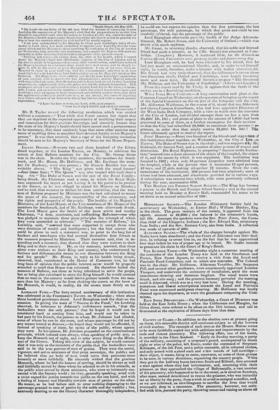" South Street, 13th May 1831.
"My Lord—In my letter of the 4th inst. I had the honour of conveying to your Lordship the expression of lliB Majesty's wish that the preparatictaS to receive him should be suspended until after his return to London on this day, uteri the state of his Majesty's health might enable him to determine whether it wauld be possible for bim to bear the exertion which his visit 'to the'City'would require. , " I am now commanded by his Majesty, to whom your Lordship's letter of yes- terday to Lord Grey has been submitted; to apprize your Lordship that the same cause which led his Majesty to delay receiving the invitation of the City of London 'on Wednesday last, unfortunately continues, arid compels his Majesty still more re. Intently to defer receiving that invitation altogether at the present season.
"Nothing but neccssity arising front the state of his health, which I cannot -doubt his Majesty's loyal and affectionate subjects of the City of London Aria be the first to admit to be paramount to every other consideration, could have induced ,his Majesty to come to a determination which be is %veil aware, and he deeply re- grets it, will be the cause of great disappointment. I mn, at the same time, lo- af-In:led to state to your Lordthip, that the ciretnnstances adverted to in your L'orvdship's letter to Lord Gres., have had no influence on his Majesty's mind on this lieclislon. His Majesty has Leen entirely sati-fred by your Lordship's explanation of your conduct with reect to the late ; and his Majesty learned. Ivith urnpvilitied pleasure, that the notice said to have been issued by your Lordship respecting Gt.., employment of the city police was totally without foundation. This assurance, which I alit authui iced to convey to your Lord-hip in the strongest terms, Will, I trust, put an end to the uneasine,;s: which the unjust imputations upon your Lordship's conti.tct appear to have occasioned, and entirely remove from your mind the apprehensiim that you could have been, in any degree, the cause of depriving your fellow-citiLenS of an honour to xvhich they had booked with so much anxious expectation.
"I have the honcur to be, my Lord, with great respect, "Your Lordship's dutiful and obedient servant, " MELBOURNE."
Mr. R. Taylor rum-ed the following resolution, xvhieh was carried without a comment—" That while this Court cannot but regret that they are deprived of the expected opportunity of testifying their respect and veneration for their gracious Sovereign, and sincerely lament that the state of his Majesty's health should have caused such a postponement
!'t to be necessary, they most anxiously hope that some other occasion may occur of enabling them to manifest their devoted loyalty to his Majesty's person." It was then resolved, that a copy of the foregoing resolution should be sent to his Majesty's Secretary of State for the Home Depart- ment.
LIVERY DIN:stmt.—Between two and three hundred of the Livery dined together, at the London Tavern, on Monday, to celebrate the return of four Reform members for the City. Mr. George Grote was in the chair. Besides the City members, the members for South- wark, and Mr. Hume, Mr. Hoblionse, and Mr. Easthope the mem- ber for Banbury, were also present ; Sir Francis Burdett was una- voidably absent. " The King " was given with the usual honour' —four times four; " The Queen" was also toasted with loud cheer s ing. On " The Duke of Sussex and the rest of the Royal Family - being drunk, the Chairman read a note, in which his Royal High- ness expressed his regret at not having it in his power to be present at the dinner, as lie was obliged to attend his Majesty on Monday; and he took that occasion to declare his lirm conviction, that the mea- sure of Reform proposed by Ministers was the best calculated to secure the peace of the country, the respectability of the aristocracy, and the rights and prosperity of the people. The healths of his Majesty's Ministers, of the Lord Mayor, of the City members, of Mr. Hume, of the members for Southwark, and of Mr. Easthope, were afterwards drunk. The Lord Mayor gave the health of the most active and worthy Chairman, "a firm, consistent, and unflinching Reformer—one who was pledged to maintain those great principles the triumph of which they were assembled to celebrate." " The enemies of Reform," his Lordship said, "asserted that none supported it except those who were destitute of wealth and intelligence ; but the best answer that could be given to such a statement was, to point to the long list of bankers and merchants who had avowed themselves firm friends to the measure proposed by Ministers. Their enemies said, that in de- manding such a measure, they showed that they were traitors to their King and to their country. He, on the contrary, asserted, that those alone were traitors to their King and country, who endeavoured by factions nnd dishonourable means to sow dissension between the King and his people!' Mr. Hume, in reply to his health being drunk, observed, that, constituted as the House of Commons was, he had long been of opinion that the public interest never would be properly attended to until that House was reformed. He therefore hailed the measure of Reform, not alone as being calculated to serve the people, but as being also calculated to serve the King himself: he would contend that no man in the country would derive greater benefit from the mea- sure than his Majesty : so far from shaking the crown on the brow of the Monarch, it would, in reality, fix the crown more firmly on his head.
LITERARY Fuso.—The forty-second anniversary of this institution was celebrated at the Freemason's Tavern on Wednesday; when about three hundred gentlemen dined. Lord Brougham took the chair on the occasion. In giving the toast of "Success to the Fund," his Lordship observed, in reference to Johnson's well-known remark, that the booksellers were the only patrons,' that he hoped it would not be considered hard as coining from him, and would not be taken in bad part by his friends, the patrons to whom Dr. Johnson had alluded, some of whom he saw in the room, and whose patronage he did not by any means intend to disavow,—he hoped they would not be offended, if, instead of speaking of them, he spoke of the public, whose agents they were. In his opinion, Dr. Johnson proceeded on the constitutional principle, which induced men always, when speaking of public acts, to /seep the Monarch out of sight, and to refer every thing to the Minis- ters of the Crown. Taking this view of the subject, he would contend that it was only as the ministers of the public that the booksellers were said to be the true patrons of men of genius. They were the useful, vigorous, and active ministers of that great sovereign, the publiti; and he believed that no body of men could serve that potentate more honestly or more faithfully. He sincerely wished that the gracious Monarch, Whom he had the honour of serving; should be always aswell and faithfully served by those whom he selected to sit in his councils, as the public were served by those ministers, who were so intimately con- nected with the literary world ; for they, generally speaking, acted with a strict regard for justice towards the public on the one hand, and with a feeling of honour and liberality towards men of genius on the other. He meant, as he had before said, to utter nothing disparaging to the patronage granted to men of genius by the noble and the wealthy ; but, anxiously desiring to see the literary character thoroughly independent, he could no but express his opinion that the first patronage, the last patronage, the only patronage, by which that great end could be sue, cessfully veldeved, was the patronage of the public.
Lord Brougham afterwards gave the health of the Judge Advocate- General, Mr. Robert Grant, and the University of Oxford;—which was drunk with much applause.
Mr. Grant, in returning thanks, observed, that his noble and learned friend had made a mistake, as he (Mr. Grant) was educated at Cam- bridge. (Lanyhter.) However, it mattered little, for the di,vtizactions between .the two Universities were growing filinter and fainter every day. Lord Broughton said, he had been reminded by his friend, that he had just made an unintentional blunder, and, in order to set himself 'iglu, he would, therefore, make a blunder with malice aforetItotilit.. His friend had very truly observed, that the differences between those two illustrious rivals, Oxford and Cambridge, were hourly becoming more and more faint. He should therefore propose " The Reverend Mr. Millman, and the University of Cambridge." (Cheers and laughter.)
From the report read by Mr. Croly, it appears that the funds of the society are in a flourishing condition.
AVEsT INnrA Doex C0111'.I.NY.—A long conversation took place at the Cominon Council on Weditesday, on the question of bringing up the report of the Special Committee on the suiject of the Company and the City. Mr. Alderman Waithman, in the course of it, stated that ten Aldermen and eleven Common Councilmen, who bad been appointed Directors of the West India Dock Company, with a view to watch over the interests of the City of London, had divided amongst them no less a sum than 33,480/. 10s. 10d.; and pieces of plate to the amount of 1,050/. had been presented to some of them, as a further recompense for their services so that the City had subscribed 29,0001. to constitute those persons w prietors, in order that they might receive 33,480/. 10s. 1011.! The Court ultimately agreed to receive the report. Jews' floserrAt..—About two hundred of the friends and supportera of this institution dined together, on Wednesday, at the City of Lou ton Tavern. The Duke of Sussex WilS ill the chair ; and was support( d 1)1 Mr. Goldsmid, Sir Gerard Noel, and a number of other persons of wealth and distinction. His Royal Highness, in proposing" Success to the Institu- tion," entered into a short account of the origin of the hospital, the object of it, and the means by which it was supported. The institution was founded in 18117 ; when only 18 persons altogether were admitted into the hospital, while at the present time it maintains 12 aged persons, 43 boys, and 17 girls, making altogether 72 inmates. Since the com- mencement of the institution, 280 persons had been admitted ; most of whom had been educated, and afterwards provided for in various ways. A subscription was entered into, which, with sums previously collected during the year, amounted to 8181. Time BRITISH AND FOREIGN SCII0OL SOCIETY.—The King has become a patron to the British and Foreign School Society ; and at the annual meeting held on :Monday at Exeter Hall, commanded his name to be set down as an annual subscriber of 100!.




























 Previous page
Previous page